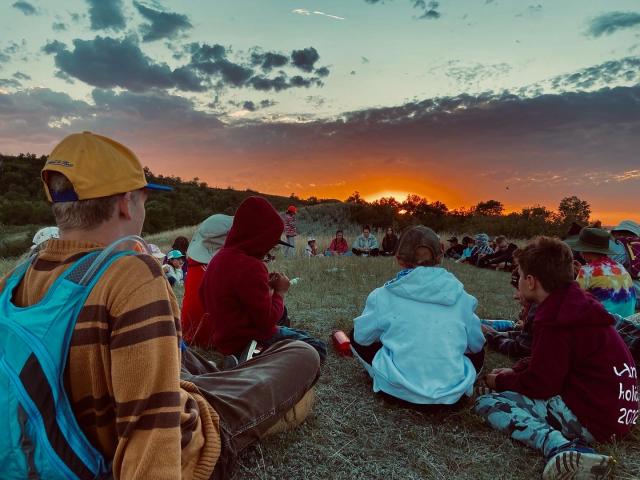United Church camps, writes Vicki Nelson, teach the radical generosity that prepares young people to create a more just world.

I love camps. As a child I attended a ton of different camps—overnight, day camps, sports camps, science camps—which in the 1990s wasn’t as common as it is for kids today. My favourite was Lumsden Beach Camp, a United Church Camp outside of Regina, SK. There are lots of reasons kids love camp. For me it was about completely stepping away from my regular life, meeting new people, and trying a new version of myself. Those weeks away created space for independence and deeper connection to the sacred. In the decades since, I have remained passionate about United Church camping. As a stewardship staff person in the United Church, I get the opportunity to chat with people running camps all over the country and last week I asked a few folks from the East Coast, Southern Ontario, and the Prairies about what is up with camps these days.
It seems that there are two stories in United Church camps right now. The first story is one of growth—more campers, more inclusive programming, deepening partnerships outside of the United Church, along with strong, competent staff. The second story was one of change and anxiety—skyrocketing operational costs, staffing issues following the Covid years, unclear relationships with local churches and the wider church, reduced funding from many areas, and—the elephant in the room—massive capital and infrastructure needs that have been deferred for years.
Many of these issues are big and live outside any camp’s sphere of influence. And even the issues that are very much “in house” are hard to navigate as our denomination as a whole is in a place of reimagining. There is much to celebrate in camping ministries–and there is also lots to figure out.
However, one thing I heard clearly from the camps that are managing best is that speaking about generosity and gratitude are common practice. These camps talk to their staff about financially supporting the camp as monthly donors, they ask their community to support them when there is an issue, and some camps even talk to campers about how the camp is financially made possible (one camp does this faithfully every Thursday, all summer).
I often talk to churches about being the training ground for God’s revolution towards a more generous and just world. I share that no-strings-attached generosity isn’t taught anywhere else, and thus churches have an important role to play. But when the reality is that many of our children and youth aren’t with us on Sunday mornings, camps need to step up and share the truth: being made in the image of a generous God means that sharing feels good, is part of our wholeness, and that giving comes out of a heart full of gratitude for an abundant world.
It doesn’t surprise me at all that the camps which are most successfully navigating inflation, youth mental health issues, massive capital deficits, nation-wide staffing shortages, and the ripple effects of several summers lost to Covid, are also the camps that teach generosity, practice gratitude, and ask their wider community for help. Campers and staff from these places go out into the world to spread these messages and generously share themselves.
So this April, when your congregation celebrates the United Church camps closest to you, remember that worshipping communities of faith aren’t the only ones teaching and modeling God’s revolutionary generosity. Camps are working right alongside them, helping to bring about the kindom of God.
— Vicki Nelson is the Stewardship Support staff for communities of faith in Western Canada. She is a proud monthly donor and volunteer to Lumsden Beach Camp in the Living Skies Region.
The views contained within these blogs are personal and do not necessarily reflect those of The United Church of Canada.